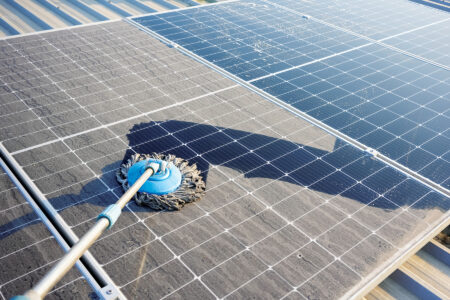Do solar panels need to be cleaned? Learn important factors to remember for cleaning and maintaining a productive energy system.
I wouldn’t swear the developers of solar panels were lazy, but I do think they didn’t want to do a lot of maintenance on their electric-generation system. (One of the earliest uses of solar panels was to power satellites because it was difficult to service them.) A big advantage of solar photovoltaics (PV) is they do their job day in and day out with extremely little upkeep. The only thing you’ll really need to do is to occasionally wash the panels with a mild dish detergent and water, and to inspect for birds and bees nests underneath the panels. Critter barriers are available to keep squirrels and other small animals from chewing on the cables.
You should also regularly check for panels loosened by wind, for cracks caused by hail, and whether kids have been using the panels for targets – or the hazard I grew up with in the country, which was Grandpa shooting at birds and squirrels with his shotgun.
I grew up on a farm on a dirt road, and the air filled with dust anytime a car or truck went by. Depending on which way the wind blew on laundry day, my clothesline-dried T-shirts might be either white or shades of gray. If you live in a similar situation, you may need to clean your solar panels frequently. But if you don’t experience much dust, your panels might go 3 to 6 months without needing to be hosed down. Other than damage inspections and regular cleaning, solar arrays don’t need a lot of maintenance. That’s why I like solar.
Hoss Boyd
Most energy systems these days allow you to remotely monitor their health and energy production, so you can easily keep an eye on the panels and record their power output. If you observe a significant drop in wattage output, hire a qualified technician to take DC voltage readings of each string of panels. If the system was designed and constructed well, the panels and strings should all have the same reading. You can also bring in a technician to do this as part of a quarterly routine.
Solar inverters have a lower life expectancy than PV panels – roughly 10 years compared with 25 years or more, respectively – so anticipate replacing an inverter at least once during your system’s lifetime. Inverter indicator lights usually fire when something goes wrong, and newer technology will offer apps for alerts.
Keep inverter vents clear of obstructions. If you’ve made any changes to the property, such as adding new buildings, update the service equipment to handle a greater electrical load. Keep in mind warranties, life expectancies, and natural degrading. Expect your solar panels to produce less electricity over time.
Kerena Reese
Hoss Boyd is founder, president, and CEO of TeraVolt Energy. Kerena Reese is an independent engineer. They’re recognized solar and energy-storage experts.
Send Us Your Power-Full Questions
We’ll do our best to answer your questions on energy subjects in upcoming issues. Email them to Letters@MotherEarthNews.com with “Energy Q&A” in the subject line.
May all your days be filled with sunshine – even when it rains!




